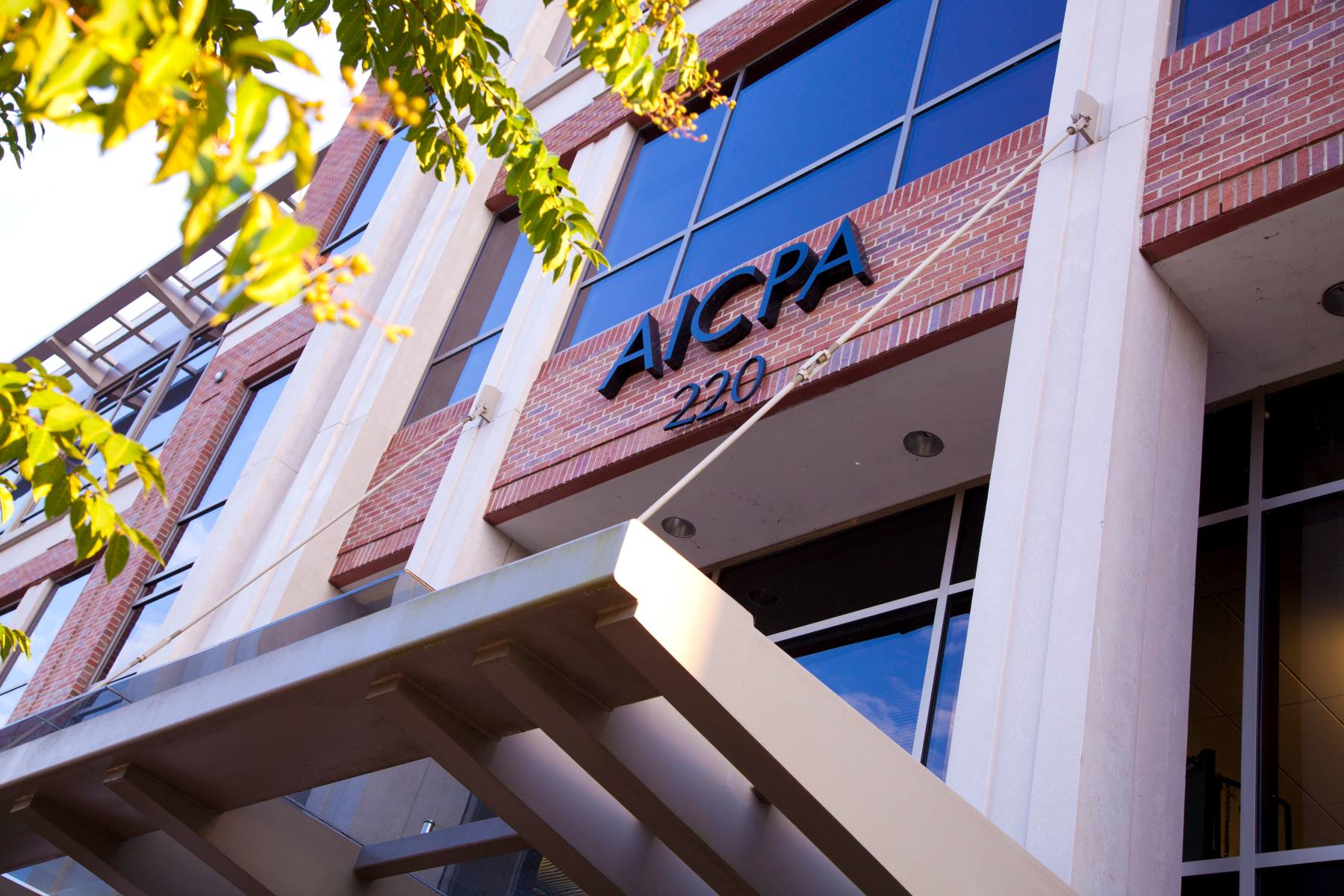

Finance
What Is AICPA In Accounting
Published: October 10, 2023
Learn what the AICPA is in accounting and how it relates to finance. Gain valuable insights into the financial industry with this comprehensive guide.
(Many of the links in this article redirect to a specific reviewed product. Your purchase of these products through affiliate links helps to generate commission for LiveWell, at no extra cost. Learn more)
Table of Contents
Introduction
Welcome to the world of accounting, where numbers and financial information come together to form the backbone of businesses and organizations. In this complex field, it is crucial to have standards and guidelines to ensure accuracy, transparency, and ethical practices. One organization that plays a pivotal role in shaping the accounting profession is the American Institute of Certified Public Accountants (AICPA).
The AICPA is a renowned professional organization that represents certified public accountants (CPAs) in the United States. With a rich history and a strong commitment to excellence, the AICPA has established itself as a driving force in shaping the accounting industry and promoting the highest level of professionalism and integrity.
In this article, we will delve into the world of the AICPA, exploring its purpose, functions, history, and benefits. Whether you are an aspiring accountant, a business owner seeking financial guidance, or simply curious about the accounting profession, understanding the role of the AICPA is essential for navigating the complex world of finance.
What Does AICPA Stand For?
AICPA stands for the American Institute of Certified Public Accountants. Founded in 1887, the AICPA is the premier professional organization for certified public accountants in the United States. It is a trusted name in the accounting industry, known for its commitment to excellence, ethics, and professionalism.
The AICPA serves as the voice of the accounting profession, advocating for the interests of CPAs and promoting the highest standards of practice. It provides a wide range of resources, education, and networking opportunities to its members, empowering them to excel in their careers and uphold the integrity of the profession.
While its primary focus is on CPAs, the AICPA also welcomes other accounting professionals and individuals with an interest in accounting. Its diverse membership includes professionals in public accounting, corporate finance, government agencies, academia, and more.
The AICPA operates under the umbrella of the Association of International Certified Professional Accountants (AICPA), which is a global organization representing more than 650,000 members worldwide. Together, they work to advance the accounting profession globally and drive innovation in the ever-evolving financial landscape.
The AICPA’s commitment to excellence is demonstrated through its rigorous standards, educational programs, and advocacy efforts. By staying at the forefront of industry developments, the AICPA ensures that its members are well-equipped with the knowledge and skills to navigate complex accounting issues.
Overall, the AICPA serves as a champion for the accounting profession, championing the importance of accurate financial reporting, ethical practices, and ongoing professional development. Its role in shaping the industry and providing valuable resources to the accounting community is invaluable.
The Role of AICPA in Accounting
The AICPA plays a significant role in shaping the accounting profession and ensuring its integrity and relevance in today’s dynamic financial landscape. Let’s delve into the key areas where the AICPA is actively involved.
Setting Standards: One of the primary functions of the AICPA is to establish and maintain the Generally Accepted Accounting Principles (GAAP). These standards serve as the foundation for financial reporting in the United States and provide consistency and comparability in financial statements. By setting these standards, the AICPA ensures that financial information is reliable, transparent, and useful for decision-making.
Professional Development: The AICPA is committed to equipping accountants with the knowledge and skills they need to excel in their careers. It offers a wide range of educational resources, including conferences, webinars, online courses, and publications. These resources cover various topics, from technical accounting and auditing to leadership and communication skills. Through its professional development programs, the AICPA fosters continuous learning and helps accountants stay up-to-date with the latest industry trends and best practices.
Advocacy: As a leading voice in the accounting profession, the AICPA advocates for policies and regulations that support the interests of CPAs and the public. It actively engages with lawmakers, regulators, and other stakeholders to ensure that the profession’s viewpoint is considered in the development of financial and accounting regulations. By advocating for favorable conditions for the accounting industry, the AICPA helps to create a thriving environment for accountants to operate in.
Ethical Standards: Upholding ethical conduct is of utmost importance in the accounting profession, and the AICPA takes this responsibility seriously. It has established a comprehensive Code of Professional Conduct that outlines the ethical obligations and responsibilities of CPAs. This code emphasizes integrity, objectivity, confidentiality, and professional competence. The AICPA also provides guidance and resources to help members navigate ethical challenges and make sound ethical decisions.
Research and Innovation: The AICPA conducts research and fosters innovation in the accounting profession. It collaborates with academia, industry experts, and technology companies to address emerging issues and explore new practices. By promoting research and innovation, the AICPA ensures that the profession evolves and adapts to the changing business landscape.
Overall, the AICPA plays a vital role in guiding the accounting profession, setting standards, promoting professional development, advocating for the profession’s interests, upholding ethical standards, and driving research and innovation. Its contributions have a profound impact on the accounting profession’s credibility and importance in supporting financial decision-making.
History and Background of AICPA
The American Institute of Certified Public Accountants (AICPA) has a rich history that dates back to its establishment in 1887. Initially known as the American Association of Public Accountants, it was founded to ensure high standards and ethical practices in the accounting profession.
Over the years, the organization underwent several name changes and transformations, reflecting its growth and expanding role in the accounting industry. In 1916, it became the American Institute of Accountants (AIA) and took on the responsibility of setting accounting standards and promoting professional excellence.
In 1957, the AIA merged with the American Society of Certified Public Accountants (ASCPA) to form the organization we know today as the AICPA. This merger brought together the expertise and resources of two prominent accounting associations, solidifying the AICPA’s position as the leading professional organization for CPAs in the United States.
The AICPA has been instrumental in shaping the accounting profession’s evolution and adapting to the changing needs of the business world. It played a pivotal role in the establishment of the Financial Accounting Standards Board (FASB) in 1973, which has since become the primary authority for setting accounting principles in the United States.
Throughout its history, the AICPA has been proactive in addressing emerging issues and advocating for the accounting profession’s interests. It has been at the forefront of technological advancements, embracing the digital age and promoting the adoption of digital tools and practices in accounting through its initiatives such as the Trusted Business Advisor Program.
Today, the AICPA continues to be a global leader in the accounting profession, with a mission to drive excellence, innovation, and ethical practices. It has expanded its reach globally through its association with the Chartered Institute of Management Accountants (CIMA), forming the Association of International Certified Professional Accountants.
The AICPA’s long and storied history reflects its dedication to advancing the accounting profession and ensuring the highest standards of practice. With its strong legacy and continued commitment to excellence, the AICPA will undoubtedly continue to be a driving force in shaping the future of accounting.
Membership and Benefits of AICPA
The American Institute of Certified Public Accountants (AICPA) offers membership to certified public accountants (CPAs) and other accounting professionals who meet specific criteria. Becoming a member of the AICPA comes with numerous benefits that contribute to professional growth, networking opportunities, and staying current with industry best practices.
Membership Eligibility: To become a member of the AICPA, individuals must hold a valid CPA license or be working towards obtaining one. Additionally, they must adhere to the AICPA’s Code of Professional Conduct and meet the organization’s requirements for education and experience.
Professional Development Opportunities: AICPA membership provides access to a vast array of professional development resources. Members can attend conferences, seminars, and webinars to stay updated on the latest accounting trends, regulations, and industry best practices. The AICPA also offers a wide range of online courses, certificates, and specialized training programs to enhance professional skills.
Technical Resources and Guidance: The AICPA offers a breadth of technical resources and guidance, including the Journal of Accountancy, which provides in-depth analysis and insights on complex accounting topics. Members also have access to online resources, research tools, guidance documents, and accounting publications, equipping them with the knowledge needed to excel in their accounting careers.
Networking Opportunities: Membership in the AICPA provides ample networking opportunities with fellow professionals and industry leaders. Through local and national events, members can connect with peers, participate in specialized interest groups, and build relationships that can lead to new business opportunities or valuable collaborations.
Advocacy and Representation: AICPA members benefit from the organization’s role as an advocate for the accounting profession. The AICPA actively represents its members’ interests in legislative and regulatory matters, working to shape policies that support the profession and provide a favorable business environment for accountants.
Affinity Programs and Discounts: AICPA membership offers access to affinity programs and discounts that can help members save money on various professional services and resources. These programs may include discounts on software, professional liability insurance, office supplies, travel, and other business-related expenses.
Career Support and Recognition: The AICPA provides career support to its members through job boards, career development resources, and opportunities to showcase achievements. The organization recognizes outstanding professionals through awards and honors that highlight their contributions to the field of accounting.
Continuing Professional Education (CPE): AICPA members have access to a multitude of CPE options, including webinars, conferences, and online courses. Meeting the ongoing CPE requirements is crucial for maintaining professional certifications and keeping up with the evolving industry regulations and standards.
Overall, membership in the AICPA offers accountants and accounting professionals a wide range of benefits, including professional development opportunities, networking resources, industry recognition, advocacy support, and access to technical guidance. By becoming a member, professionals can enhance their skills, expand their knowledge, and stay at the forefront of the accounting profession.
AICPA’s Code of Professional Conduct
The American Institute of Certified Public Accountants (AICPA) is committed to upholding the highest ethical standards in the accounting profession. To guide its members in maintaining these principles, the AICPA has established a comprehensive Code of Professional Conduct.
The Code of Professional Conduct outlines the responsibilities, obligations, and ethical guidelines that all AICPA members must follow. It serves as a framework for maintaining professional integrity and fulfilling fiduciary duties. The code covers various areas, including professional competence, independence, integrity, objectivity, confidentiality, and professional behavior.
Professional Competence: AICPA members are expected to possess the necessary knowledge and skills to provide proficient accounting services. They are encouraged to stay updated on relevant technical and professional developments, engage in continuing professional education, and strive for excellence in their work.
Independence: AICPA members must maintain independence in both appearance and fact when providing auditing, attestation, and other related services. They are required to avoid any conflicts of interest or relationships that could impair their objectivity and professional judgment. The code also provides guidance on relationships with clients, employers, and other parties that may pose threats to independence.
Integrity and Objectivity: Members are expected to act with integrity and maintain objectivity in all professional and business relationships. This includes being honest, truthful, and free from conflicts of interest or biases that could influence their work. They should exercise professional judgment based on facts and analysis, ensuring that their decisions and recommendations are impartial and in the best interests of their clients or employers.
Confidentiality: AICPA members have a duty to maintain the confidentiality of all information obtained during the course of their professional relationships. They must safeguard privileged and proprietary information, only disclose such information with proper authorization, and use it solely for legitimate purposes related to their professional responsibilities.
Professional Behavior: The code emphasizes the importance of acting in a manner consistent with the reputation of the profession and the public’s trust. Members are expected to comply with laws, regulations, and professional standards, avoid deceptive or fraudulent practices, and contribute to the integrity and reputation of the accounting profession.
The AICPA’s Code of Professional Conduct provides a solid foundation for professional behavior and ethics in the accounting industry. It serves as a guide for AICPA members to consistently adhere to the highest standards of integrity, objectivity, competence, and confidentiality in their work. By upholding these principles, AICPA members contribute to the public’s trust and confidence in the accounting profession.
AICPA’s Advocacy and Standards Setting
The American Institute of Certified Public Accountants (AICPA) plays a critical role in advocating for the accounting profession and setting standards that promote excellence, transparency, and ethical practices. Let’s explore how the AICPA fulfills these responsibilities.
Advocacy: The AICPA actively engages in advocacy efforts on behalf of its members and the broader accounting profession. It collaborates with lawmakers, regulators, and other stakeholders to shape policies and regulations that impact the profession. Through its government relations team, the AICPA monitors legislative and regulatory developments, provides input on proposed changes, and advocates for positions that support the interests of CPAs and the public.
Standards Setting: The AICPA has a significant role in establishing auditing, accounting, and ethical standards for the profession. It operates the Auditing Standards Board (ASB), which develops and issues Generally Accepted Auditing Standards (GAAS). These standards govern the conduct of audits and provide direction for auditors in their work. Additionally, the AICPA’s Accounting and Review Services Committee (ARSC) issues Statements on Standards for Accounting and Review Services (SSARS), which set guidelines for review and compilation engagements.
The AICPA also collaborates with international accounting standard-setting bodies to promote convergence of accounting standards globally. It works closely with the International Federation of Accountants (IFAC) and other organizations to develop harmonized global standards and ensure consistent financial reporting practices across jurisdictions.
Furthermore, the AICPA actively participates in the standard-setting activities of the Financial Accounting Standards Board (FASB) and the Governmental Accounting Standards Board (GASB). It provides input and expertise to these organizations to influence the development of accounting standards in the United States.
Through its involvement in standard setting, the AICPA aims to enhance the quality and integrity of financial reporting, strengthen the profession’s credibility, and ensure that accountants have clear guidelines to follow in their work.
In addition to setting accounting and auditing standards, the AICPA also establishes ethical standards for its members. The AICPA’s Code of Professional Conduct outlines the ethical principles that members should adhere to, including integrity, objectivity, confidentiality, and professional behavior. These standards help maintain public trust and confidence in the accounting profession and guide members in their decision-making process.
Overall, the AICPA’s advocacy efforts and involvement in standard setting contribute to the ongoing development and improvement of the accounting profession. By advocating for favorable conditions for CPAs, influencing standards that enhance financial reporting, and ensuring ethical conduct, the AICPA upholds the integrity and relevance of the profession.
AICPA’s Programs and Initiatives
The American Institute of Certified Public Accountants (AICPA) offers numerous programs and initiatives to support the professional growth and success of its members. These programs are designed to address the evolving needs of the accounting profession and provide valuable resources, tools, and opportunities for members to excel in their careers. Let’s explore some of the key programs and initiatives offered by the AICPA.
Continuing Professional Education (CPE): The AICPA offers a wide array of CPE programs and courses to help members fulfill their ongoing professional education requirements. These programs cover a broad range of topics, including technical accounting updates, industry-specific guidance, professional ethics, and leadership development. Members have access to in-person seminars, webinars, self-study courses, and conferences to stay up-to-date with the latest developments in their field.
Member Sections and Interest Groups: The AICPA provides specialized member sections and interest groups that cater to specific areas of practice or professional interests. These groups offer a platform for networking, knowledge sharing, and collaboration with peers who have similar interests or expertise. Members can join sections focused on areas such as forensic accounting, tax, auditing, personal financial planning, and more, allowing them to connect with like-minded professionals and access tailored resources.
Promoting Diversity and Inclusion: The AICPA actively promotes diversity and inclusion within the accounting profession. It has developed initiatives and programs to encourage underrepresented groups to pursue accounting careers and support their professional success. The AICPA’s initiatives aim to create a more inclusive profession, foster a sense of belonging, and ensure equal opportunities for all individuals interested in the field.
Peer Review Program: The AICPA operates a Peer Review Program to enhance the quality of accounting, auditing, and attestation services provided by its members. This program helps ensure that firms comply with professional standards and maintain high levels of competence and professionalism. Firms undergo periodic peer reviews conducted by independent CPAs, which assess their adherence to standards and provide valuable feedback for improvement.
Trusted Business Advisor Program: The AICPA’s Trusted Business Advisor Program equips accounting professionals with skills beyond traditional accounting services. This program focuses on developing competencies in areas such as strategic planning, leadership, communication, and business advisory services. By expanding their skill set, members can position themselves as trusted advisors to their clients, providing valuable insights and guidance for their financial and business decisions.
Student Programs: The AICPA offers programs and resources specifically tailored to accounting students. These initiatives aim to support students throughout their academic journey, provide career guidance, and prepare them for the professional challenges they will encounter. The AICPA offers scholarships, mentoring programs, leadership opportunities, and informational resources to help aspiring accountants succeed in their educational pursuits and transition into the profession.
These are just a few examples of the programs and initiatives offered by the AICPA. As the accounting profession continues to evolve, the AICPA remains dedicated to providing its members with the tools, resources, and support they need to thrive in their careers and contribute to the continued success of the profession.
AICPA’s Relationship with CPA Exam
The American Institute of Certified Public Accountants (AICPA) has a vital relationship with the Uniform Certified Public Accountants (CPA) Examination, commonly referred to as the CPA Exam. The AICPA plays a significant role in the development, administration, and ongoing enhancements of this exam, which is a crucial step in obtaining CPA licensure in the United States.
The AICPA, in collaboration with the National Association of State Boards of Accountancy (NASBA), oversees the administration of the CPA Exam. The AICPA contributes its expertise and knowledge to ensure the exam remains rigorous, relevant, and comprehensive, reflecting the skills and competencies required of entry-level CPAs.
Exam Development: The AICPA is responsible for the development of the CPA Exam content. This involves conducting extensive research and analysis to identify the knowledge and skills that are essential for a successful CPA. The AICPA’s Board of Examiners, composed of accounting professionals with a wealth of experience, determines the content and structure of the exam based on industry needs and input from various stakeholders.
Exam Administration: While the AICPA is involved in the content development, NASBA handles the logistics of exam administration. NASBA coordinates exam registration, test center logistics, and the release of scores. Through this partnership, the AICPA ensures that the CPA Exam is delivered efficiently and securely for aspiring CPAs across the United States.
Periodic Updates and Enhancements: The AICPA regularly reviews and updates the CPA Exam to ensure it remains relevant and aligned with the changing landscape of the accounting profession. The AICPA considers advancements in accounting principles, emerging areas of practice, and evolving technology when making updates to the exam. By doing so, the AICPA ensures that the CPA Exam reflects the skills and competencies required of modern-day CPAs.
Exam Blueprint and Content Specification Outlines: The AICPA provides the CPA Exam blueprint and content specification outlines, which serve as essential resources for candidates preparing for the exam. These documents outline the topics covered in each section of the exam and provide a breakdown of the knowledge and skills candidates are expected to demonstrate. The AICPA’s clear guidance and specifications help candidates focus their preparation efforts effectively.
Quality Assurance: The AICPA maintains a robust quality assurance process for the CPA Exam. It works closely with its testing vendor partners to ensure the accuracy, reliability, and fairness of the exam. This process includes ongoing monitoring, statistical analysis, and item review to identify potential issues or areas for improvement and to maintain the integrity of the exam.
The AICPA’s relationship with the CPA Exam demonstrates its commitment to fostering excellence and maintaining high standards within the accounting profession. By actively contributing to the development, administration, and ongoing enhancements of the exam, the AICPA ensures that the CPA credential continues to represent proficiency and expertise in the field of accounting.
Conclusion
The American Institute of Certified Public Accountants (AICPA) plays a pivotal role in shaping and advancing the accounting profession. With a rich history, the AICPA has positioned itself as a leader in promoting excellence, ethics, and professionalism in the field of accounting. Through its various programs, initiatives, and advocacy efforts, the AICPA supports its members’ professional growth, advocates for favorable conditions for the accounting industry, and sets high standards for the profession.
From its role in establishing accounting standards and providing professional development opportunities to its commitment to upholding ethical conduct, the AICPA contributes to the credibility and integrity of the accounting profession. Through its steadfast efforts in advocacy and collaboration with standard-setting bodies, the AICPA ensures that accounting professionals have a voice in shaping regulations and standards that govern their work.
Furthermore, the AICPA’s relationship with the CPA Exam demonstrates its dedication to maintaining the rigor and relevance of the exam, ensuring that aspiring CPAs are equipped with the necessary skills and knowledge to thrive in the profession.
Membership in the AICPA offers accountants and accounting professionals numerous benefits, including access to valuable resources, professional development opportunities, networking platforms, and guidance in maintaining the highest ethical standards. The AICPA’s commitment to diversity and inclusion also fosters an inclusive profession and promotes equal opportunities for all individuals interested in the field of accounting.
In conclusion, the American Institute of Certified Public Accountants (AICPA) stands as a beacon of excellence, professionalism, and integrity in the accounting profession. Through its steadfast commitment to setting standards, providing resources, advocating for the profession, and supporting its members, the AICPA ensures the continued growth, relevance, and impact of the accounting profession in the ever-changing business landscape.














